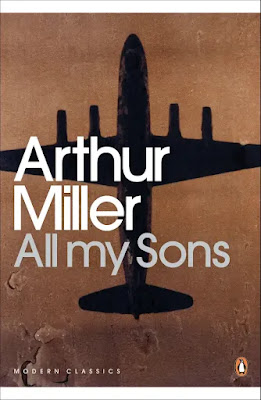This blog is a part of my Bachelor of Arts syllabus, as we are preparing our Digital Portfolio. We are all tasked with writing blogs on the literary works we have studied.
"All My Sons"
"All My Sons" by Arthur Miller is a poignant drama that delves into the moral complexities of the American Dream and the consequences of one's actions. Set in post-World War II America, the play centers around the Keller family, whose patriarch, Joe Keller, runs a factory that produced faulty aircraft parts during the war. As the truth about Joe's role in the tragedy emerges, the family is torn apart by guilt, denial, and the desire to protect their reputation. Themes of guilt, responsibility, and the pursuit of the American Dream permeate the narrative, as the characters grapple with the repercussions of past decisions. Through powerful storytelling and rich characterization, "All My Sons" offers a thought-provoking exploration of the human condition and the moral dilemmas faced by individuals in the pursuit of success and happiness.
Arthur Miller
Arthur Miller (1915-2005) was an influential American playwright and essayist whose works continue to resonate with audiences worldwide. Born in New York City to a Jewish immigrant family, Miller grew up during the Great Depression, an experience that deeply influenced his later exploration of themes such as social and economic injustice. His upbringing in this tumultuous time period provided him with a keen understanding of the struggles faced by ordinary Americans, which is reflected in the themes of his plays.
Miller's career reached its zenith with the success of his seminal work, "Death of a Salesman" (1949). This play, which won the Pulitzer Prize for Drama, established him as a leading voice in American theater and solidified his reputation for insightful explorations of the American psyche. Through the character of Willy Loman, Miller delved into the complexities of the American Dream and the disillusionment that often accompanies it, striking a chord with audiences grappling with post-war anxieties and societal changes.
In addition to "Death of a Salesman," Miller penned several other acclaimed plays that further cemented his legacy. "The Crucible" (1953), a dramatization of the Salem witch trials, served as an allegory for McCarthyism and the Red Scare, reflecting Miller's own experiences during this tumultuous period of American history. "A View from the Bridge" (1955) and "All My Sons" (1947) are among his other notable works, each exploring themes such as family dynamics, moral responsibility, and the individual's struggle against societal pressures.
Beyond his contributions to literature, Miller was also politically active throughout his life. He spoke out against McCarthyism and the suppression of civil liberties, becoming a prominent voice for social justice. His marriage to Marilyn Monroe and his experiences during the McCarthy era further fueled his activism and influenced his later works.
Today, Arthur Miller is remembered as one of the greatest playwrights of the 20th century, with his works being regularly staged in theaters around the world and studied in academic settings. His insightful exploration of the human condition, coupled with his commitment to social justice, ensures that his legacy continues to endure, inspiring generations of artists and audiences alike.
Key Facts:
Author: Arthur Miller
Genre: Drama
Date of Composition: 1947
Setting: Suburban America, shortly after World War II.
Sources: Inspired by a true story of faulty aircraft parts being sold to the military during World War II.
First Performance: Premiered on Broadway in 1947, directed by Elia Kazan.
Plot:
"All My Sons" revolves around the Keller family, particularly Joe Keller, a businessman who runs a factory that produced faulty aircraft parts during World War II, leading to the deaths of twenty-one pilots. The play begins with tensions rising as the Kellers' son Chris plans to marry Ann Deever, the former girlfriend of their other son, Larry, who went missing in action during the war. As the truth about Joe's role in the production of the faulty parts is revealed, the family is torn apart by guilt, denial, and the desire to protect their reputation.
Characters:
Joe Keller: Patriarch of the Keller family, a businessman struggling with guilt over his role in the production of faulty aircraft parts.
Kate Keller: Joe's wife, who refuses to believe that their son Larry is dead, clinging to the hope of his return.
Chris Keller: The Kellers' son, who returns from the war and plans to marry Ann Deever, Larry's former girlfriend.
Ann Deever: Larry's former girlfriend, who returns to the Keller home and brings secrets from the past to light.
George Deever: Ann's brother, who holds Joe Keller responsible for his father's imprisonment.
Dr. Jim Bayliss: The Kellers' neighbor and friend, a doctor who struggles with the conflict between his professional ambitions and personal ethics.
Themes:
Guilt and Responsibility: The play explores the consequences of Joe Keller's actions and the burden of guilt carried by the characters involved in the production of faulty aircraft parts.
Family and Loyalty: The Keller family is torn apart by conflicting loyalties, as they grapple with the truth about Joe's role in the deaths of the pilots.
The American Dream: Arthur Miller critiques the American Dream, suggesting that the pursuit of material success can lead to moral compromise and tragedy.
Truth and Lies: The play delves into the complexities of truth and deception, as characters struggle to confront painful realities and protect their own interests.
Conclusion:
"All My Sons" concludes with Joe Keller's suicide, driven by guilt and the realization of the devastation caused by his actions. The play ends with Chris Keller vowing to rebuild his life and carry on, despite the shattered illusions of the American Dream and the painful truths unearthed about his family's past.
Thank you so much for reading this blog.

.jpg)
No comments:
Post a Comment